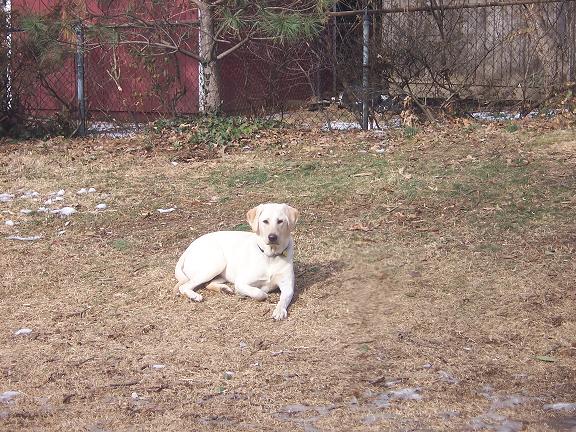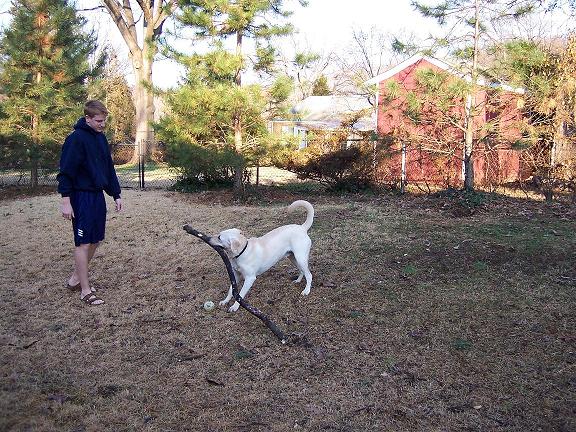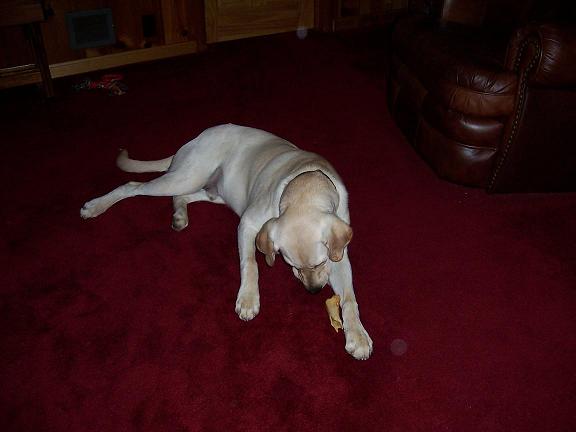I've just stumbled on Chase Me Ladies, I'm in the Cavalry, a hilarious blog written by Harry Hutton (could be a pseudonym, *shrug*) a Brit. An English teacher, I'm guessing, based on a couple of his posts "I Hate Teaching English" and "Your Child Is An Illiterate Cabbage." Check it out and have fun.
Mary: January 2005 Archives
This is the best justification of hate-crime laws I've ever read. My hat's off to the author, David Neiwert.
Mike reminded me this morning that I forgot to Dog Blog yesterday. He wants to see a new pic of his pup. I call this one "Dog Feeling Miffed After Getting Yelled At".

I, too, oppose the confirmation of Alberto Gonzales. Add me to the list.

Hat tip to Patrick Nielsen Hayden at Electrolite, who swiped this from Body and Soul before I swiped it from him.
Now we know that on election day, the exit polls were off by some 5.5 percent, predicting an easy Kerry victory.
I'm 52 years old, and throughout my life, every four years the TV networks have "called" the election sometime during the evening of election day, based on exit polls. They didn't used to bother to wait until the polls had closed; that's how confident they were of exit polling data.
When did they ever get it wrong? The first time they ever had to change a call was in Florida in 2000, and we know what happened there. The exit polling data correctly reflected the will of the voters: more people tried to vote for Al Gore. Tens of thousands of ballots were invalidated in heavily democratic districts. The butterfly ballot wasn't the biggest problem. The biggest problem was in Duval County, where the names of ten presidential candidates were spread over two pages, and instructions on the walls in the polling places said "vote on every page". As many as a third of all the ballots were invalid because people had voted twice for president: for Gore on page one, and an unknown minor party candidate on page two.
What about 2004? The exit polling data was off by 5.5 percent. That's huge; I'm sure it's well outside the margin of error. Why aren't we hearing more about this? If Kerry raises the issue he's called a "sore loser", and anybody else who complains is called crazy, a member of the tin-hat conspiracy crowd.
At the risk of being dismissed along with the other tin-hat fruitcakes, my theory is that after the early exit polling data showed Kerry winning, republican vote counters here, there, everywhere, began shaving votes off of Kerry's total and giving them to Bush. I'm not suggesting it was a conspiracy, I'm saying a multitude of republican election officials behind closed doors simply took matters into their own hands. Ten thousand votes here, fifteen thousand there--it adds up. One person decides to simply subtract a few votes from Kerry, another decides to add a few to Bush. Somebody over here gives Kerry's votes to the Libertarian candidate, somebody over there "adjusts" an optical scanner or a touchscreen machine.
Banking on there never being a hand recount, and if there is, well, it's nothing that couldn't be explained as a simple error: oops, heh.

Picture swiped from The Village Voice.
Go read James Wolcott's short piece Siege Mentality. What a change from the only inaugural parade I ever went to: Clinton's second inaugural. Mike was eleven years old then, and he and I rode the Metro downtown to see the parade. It was very cold--colder than Washington was yesterday. The crowds were incredible. Everyone was happy. I didn't see any protestors. There must have been police around, but I guess I just didn't notice them. There were no checkpoints. I don't remember any restrictions at all. We walked for blocks along the parade route searching for a place where we could stand and catch a glimpse of the president as his car drove by, but the crush of people all along the route made it nearly impossible. I think we finally caught just the briefest glimpse of the president's car. We knew it was approaching because the crowd started cheering wildly.
We didn't stay to see the whole parade because a) we could hardly see anything, and b) we were freezing. But I'm glad we did it. I hope Mike remembers it. I hope he remembers what America was like before people had to sign loyalty oaths to see the president speak and donate large sums of money to witness the inaugural parade; before parade routes were lined with double rows of police in riot gear.
Or rather, there is a Goddess-- now I know she's a woman. To your health!
Considering that today is the re-coronation of G.W. Bush, this news couldn't have come at a better time. The Goddess has a sense of humor.
HEY!! IS THIS KINDLING??

Today I joined the ranks of Visionary Philosophers. This means I now feel a kinship with various kind-of-scary wild-eyed people who stand on street corners in large cities and rant to no one in particular in a way that, if you listen long enough, makes a strange kind of sense, or doesn't, as the case may be.
After being taunted for years by pop-up ads for online IQ tests, I was sufficiently boredoutofmymind at work today to take one. It would be impolite, or something, for me to post my score, so I won't. I guess it was a fair score, for me. Different tests give different results. I've scored higher; I've scored lower.
Anyway, I got this little blurb:
"Your Intellectual Type is Visionary Philosopher. This means you are highly intelligent and have a powerful mix of skills and insight that can be applied in a variety of different ways. Like Plato, your exceptional math and verbal skills make you very adept at explaining things to others - and at anticipating and predicting patterns. And that's just some of what we know about you from your IQ results."
And then, of course, they wanted to sell me a 15-page report that would tell me all about myself. Thanks but No Thanks.
Well, wow. I mean, isn't that A BIT OVER THE TOP? I mean "Like Plato"? I wonder what the possible Intellectual Types are. Scientific Genius? If I had answered a couple more questions correctly could I have gotten ''Like Einstein"? or does one have to miss more of the verbal questions for that? It'd be fun to get a bunch of friends together and play around with this test, to see what we could come up with. If we could answer every question correctly would we have a Rennaissance Man intellect, "Like Leonardo Da Vinci"?
Yum yum, chewed up old bone...

Here, finally, is the long-put-off sequel to The Insulated Jar.
It's been five years since my husband died, and the time has run like sand through my fingers. My son was a freshman in high school then; now he's a sophomore in college. Maybe this time has gone by so rapidly because these have been the best years we've had. The fourteen years that preceded my husband's death were very, very difficult. On the day of the funeral four of my son's friends came over and hung out with him, all dressed in church-going clothes, they just sat and talked and sometimes they joked and laughed. They all left together when a couple of moms showed up, and after they walked out my son said "That's the first time I've had friends over to this house in four years."
After his death, I was consumed by the need to understand what had been "wrong" with my husband. I had been with him for twenty years, and I had long known that his emotional reactions seemed bizarre; as though he first decided how to feel, and then pretended it. But he never quite got it right. I couldn't explain it, but he was always just a bit "off" in his emotional expression. At times he would gush embarrassingly in lavish praise of a salesclerk in a store; at other times he would be shockingly, pointlessly rude. Unless the emotion was rage, or fear, or some such primal reaction--these came naturally.
I knew, too, that he was hyper sensitive to noise. I had frequently seen him startle in response to sounds that didn't bother me at all. Our son played with balloons because they were quiet; every time he came down the stairs from his room the sound of his footsteps set my husband's teeth on edge.
There were other things I couldn't explain. The blinds in his study had to be open. The blinds in my study had to be closed. Although he was a brilliant man, a math professor when I married him, he couldn't relate his knowledge to the world around him. He couldn't understand simple mechanical systems. We had a bizarre conversation one day in which I tried to convince him that conservation of mass was not just a rule used in the formulation of mathematical equations, it was a real phenomenon. He said "But what happens when wood burns?" and I described the classic experiment in which wood is burned in a sealed container, and the combined weight of the released water vapor, smoke, and ash is exactly the same as the original weight of the wood.
What was my husband's diagnosis? He hadn't suffered from depression, although a sudden onset of depression had certainly killed him. I've already described in my earlier post (linked above), how I stumbled on the answer, so I won't repeat the story here. Suffice it to say that once I discovered Asperger's Syndrome, it all became clear.
For a while I posted to a private, invitation-only online message board that was a support group for partners of people with Asperger's Syndrome. They would all understand what I'm saying: that the years since my husband's death have been the best years of my son's life. Their stories all mirrored my own. There was a woman whose husband bought all his clothes at Nordstrom while his children slept on mattresses on the floor because they had no beds. There was the time a piece of heavy furniture fell on a woman's two-year-old son, and her husband's only reaction was "Did it break?" There was the time my own son slipped and fell on the stairs and my husband's only response was anger at the noise. Again and again, the stories described narcissism beyond comprehension, and a complete lack of empathy.
I'm likely to get some angry email in response to this, so I'll say up front that like all disorders on the autism spectrum, there is tremendous variation between people with AS (most of whom are men), and I've heard of at least one case in which a man who recognized his symptoms worked hard to form a bond with his children. Congratulations to those few. The majority, I'd say, reject the idea that they have any shortcomings at all. Indeed, it's typical for an "Aspie" to reject any diagnosis and believe he's perfectly all right and the rest of the world is hysterical.
My husband and I had been married for three and a half years before our son was born, and we'd lived together for two years before getting married. And yet I couldn't foresee how difficult it would be to bring a baby into our lives. It's not that the courtship and early years had been trouble free--even the courtship years had been difficult. You may well wonder why I chose to marry a man to whom it was difficult to be engaged. All I can say is that I learned to navigate the rocky shores and find the few calm inlets. I attribute this tolerance to the home I grew up in--which is all I want to say about that at this time.
And besides, there were qualities I greatly admired in my husband. Most people who see the movie "A Beautiful Mind" probably wonder why in hell the wife ever married the guy, as nuts as he was. I can answer that question, because I understand perfectly why she married him; I'd have married him too. She wanted an extraordinary man. My husband was a very successful and highly respected mathematician. After his death a memorial conference was held for him at the Mathematical Sciences Research Institute on the campus of UC Berkeley, and a scholarship was established in his name.
So I navigated the rough waters of our relationship, and I learned things about him that helped. Such as, he was always, always in a good mood after a good night's sleep. His mood inevitably deteriorated as the day wore on. I assume my husband's brain chemistry was unstable, and sleep corrected whatever went out of whack during his waking hours. As fate would have it, I am not a morning person, and I was never on his wavelength after dragging myself out of bed in the morning. Nevertheless, I relied on my husband's happy mood at the beginning of the day. I knew it didn't matter if he went to bed mad at night--the anger would be completely gone in the morning. I knew I'd have a better chance of getting a positive response to any suggestion if I waited to ask until morning. There was a flip side to this trait: he was utterly dependent on sleep and quickly destabilized when it eluded him. He committed suicide after suffering just one week of insomnia.
Despite the difficulty of the early years, I failed to anticipate how much worse it would get after our son was born. My husband couldn't tolerate disruption of his schedule--a typical Aspie trait. His lack of an emotional bond with our son meant, I guess, that to him it was as though we were baby-sitting a stranger's child, constantly watching the clock, counting down the minutes until the child would be picked up, but the child was never picked up--he was ours.
And yet--he was not incapable of forming a strong bond, and he formed one with me. How I came to this conclusion several years after his death will be the subject of another entry.

